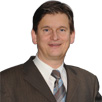
|
Prof. Thomas Ludwig
Director
German Climate Computing Centre (DKRZ)
Germany
Biography
Thomas Ludwig studied computer science and philosophy at Universität Erlangen-Nürnberg, Germany. He received a doctoral and habilitation degree in computer science from Technische Universität München. From 2001 to 2009 he held a professor position for parallel computing at Universität Heidelberg. Since
2009 he is professor at Universität Hamburg and director of the German Climate Computing Center (DKRZ) in Hamburg, Germany. His research field is high performance computing with a focus on handling high data volumes and on energy efficiency. He is author and co-author of more than 100 scientific publications at conferences and in journals and organizes the scientific sessions of the International Supercomputing Conference Series.
Abstract
High Performance Computing and Modern Science
High Performance Computing (HPC) became an instrument for many modern sciences.
In particular numerical simulations are based on parallel computing in HPC systems. Beside experiment and theory they are considered as the third pillar of knowledge gaining. However, HPC became very expensive over the last ten year. In particular, modern systems ask for huge amounts of electrical power such that the possible research starts to be limited by the research institution´s budget for power. Moreover, programming these systems that exhibit massiv parallelism in their components requires scientists knowledgeable in software engineering.
Finally, there is now a new challenge for our researchers: the aggregation of measured and generated digital data leads to new epistemological concepts. It is usually called data intensive science or the Fourth Paradigm. Available data becomes the primary product for new and unique insights. The talk will discuss current challenges in HPC and data intensive science and will highlight the potential development in the field until the end of the decade. Beyond 2020 the development in computer technology is difficult to predict - modern science and modern life ask however for a sustained progress.
|

